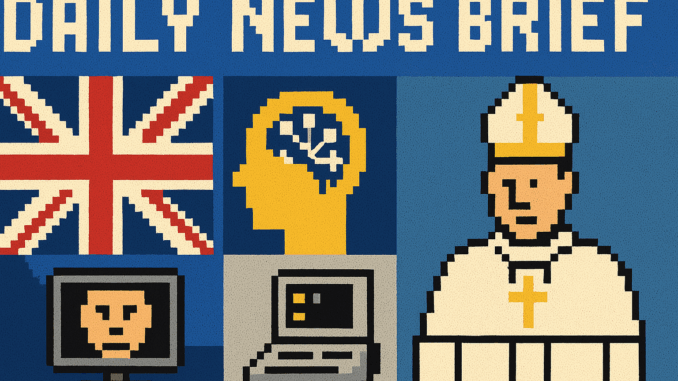
UK Pioneers AI Literacy with Major Tech Collaboration
Source: Research Live
The government of the United Kingdom, in conjunction with tech giants such as Amazon, Google, and Microsoft, has embarked on a mission to foster AI literacy among the British workforce. This ambitious programme aims to equip 7.5 million people-about 20% of the workforce-with the basic skills needed to thrive in an AI-driven economy. It’s reminiscent of the days we spent learning BASIC on our ZX Spectrums, but now we’re programming our future labour force. By focusing on practical, ethical, and sector-specific AI applications, this initiative seeks to ensure the UK stands at the forefront of tech innovation. While the programme promises to bolster Britain’s technical capabilities, it’s also keenly aware of the fears surrounding workforce displacement in the age of automation.
Pope Leo Urges Tech Leaders Towards Ethical AI
Source: Yahoo News UK
In a gesture reminiscent of past pontifical advocacy for labour rights, Pope Leo has taken centre stage in the realm of AI ethics. Addressing a packed audience of tech executives at the Vatican, the Pope called for a conscientious approach in AI development. His sermon underscored the peril of inequality and the erosion of human dignity through unchecked AI advancements. The sweater-clad Senator of Silicon Valley, attended by heavyweights like Apple and OpenAI, saw parallels drawn to our BBS discussions of old-only this time, it’s about divine guidance in machine morality. As AI seeps into health and justice systems, Pope Leo’s mandates for transparency and equitable access resonate deeply with the core of ethical tech development.
GPs Advised to Appoint ‘AI Safety Officers’
Source: Pulse Today
In a response that evokes the caution of re-checking cassette backups for errors, GP practices across the UK have been urged to appoint a clinical safety officer before embracing AI transcription tools. Following a series of hiccups where AI erroneously reported patient data, the Integrated Care Board demands that practices have trained specialists to ensure AI outputs align with clinical accuracy and privacy standards. These officers will act as guardians, vigilantly monitoring AI’s real-time decisions to avoid potential mishaps, balancing efficiency with the absolute imperative of patient safety. This measure reflects a digital age where the stakes are high, and the margin for error is razor-thin.
UK Innovation Tied to Talent Clusters, says Lord Vallance
Source: MSN UK
Speaking at the Tech Nation 2025 report unveiling, Science Minister Lord Patrick Vallance emphasised the critical role of clusters in propelling UK innovation-a nod to the dreams of a ‘Silicon Glen’. Drawing parallels to Silicon Valley, Vallance articulated the need for nurturing talent hubs, connecting academia with the private sector, particularly in cities like Cambridge for biotech and Manchester for AI. Concerns loom over a potential brain drain and underfunded R&D, prompting Vallance to advocate for enticing talent with attractive tax policies and streamlined visa processes. The forecast calls for tripling partnerships by 2030, ensuring the UK remains a powerful player on the global tech stage.
Reassessing Autonomy in AI Transcription at GP Practices
Source: Pulse Today
In an era where AI might not always get it right the first time, UK GP practices face a new mandate: appointing clinical safety officers to oversee AI transcription tools. This initiative is a security buffer, ensuring AI outputs are consistent with medical accuracy, echoing days when one needed to guard against cassette tape corruption. The directive underscores the perhaps uneasy marriage of tech efficiency with clinical precision, following troubling incidents of AI-generated misdiagnoses. By requiring specialist monitoring, the directive aims to maintain trust and integrity in patient care while leveraging digital advancements.
This Day in Tech History: The ‘Manchester Baby’ Changes Everything
Seventy-seven years ago, the quiet hum of innovation rose from a Manchester laboratory-the birthplace of the world’s first stored-program computer. Known as the “Manchester Baby,” this machine was the progeny of wartime ingenuity and post-war optimism. On the 21st of June 1948, it successfully ran its first program, turning the wheels of digital destiny. This rudimentary but revolutionary device moved us from the mechanical whimsy of punch cards to the dawn of electronic memory. Its legacy is as profound as the BASIC on BBC Micros and the smartphones in our pockets today. In the Baby’s whistle of circuits and cathode rays, lay the seeds of our interconnected, digital age, reminding us that behind every new dawn is an audacious dream quietly taking form.

Leave a Reply